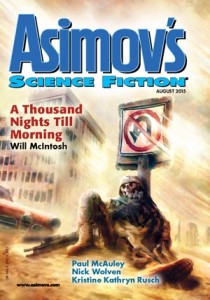 Kelly’s story “Two Year Man” is out today! It’s her first appearance in Asimov’s, and it is gentle yet thoroughly hair-raising. The August issue just hit newsstands; the virtual edition is available, and there’s even an interview with Kelly and some other Asimov’s first timers, by James Patrick Kelly, that you can browse for dessert.
Kelly’s story “Two Year Man” is out today! It’s her first appearance in Asimov’s, and it is gentle yet thoroughly hair-raising. The August issue just hit newsstands; the virtual edition is available, and there’s even an interview with Kelly and some other Asimov’s first timers, by James Patrick Kelly, that you can browse for dessert.
Yesterday’s Joss Whedon post was something I’ve been cogitating awhile, and when I got the first few thinky grapes off the vine I took it to Kelly and the ingenious Linda Carson for a good stomp. It was an effective creative ferment, and I’m pleased with the essay. But things got said and thoughts got aired that didn’t quite make it into the final draft, which is why now Linda has tackled another piece here, in her essay: “Cutting Edge Doesn’t Mean Solo.”
The Joss essay is part of something larger. I am seeing signs, here and there, that a hearty portion of my corner of the Internet–in other words, the SF and fantasy writing community–is open to finding ways to counterbalance the online expression of ancient, vicious human behaviors. These are things that have been around forever: silencing, bullying, shaming, pile-ons. There’s some talk of developing tactics that take us beyond snark. Joshua Choplinksy, for example, lays this out:
I feel that this, which comes to me via Doug Lain, is the essence of an article I no longer have to write. I love a good snarky piece as much as the next guy, but it’s hard to write a piece of that kind without giving lots and lots of energy and attention to the thing or person you’re against. It’s a reward for bad behavior that also acts, fundamentally, as a tactic of escalation.
As I’ve said, I’d love to see a flowering of sharp, hilarious, infinitely readable clickbaity articles that didn’t involve taking someone down a peg. It’s harder to make praise or kudos or approbation interesting and giggle-worthy. I know this, because I write book reviews. Believe me, a brilliant novel is much harder to write about than an interestingly flawed one. But making up the word noises is our primary skillset. If snark has a comedic polar opposite, we’re up to the task of inventing it.
Setting aside the specific issue of pointed responses to oh-so-deserving stupidity online, I’m also seeing conversations whereby people are gathering up How-To articles on the healthy responses to trolling, bullying, and other kinds of internet pile-ons. (If you have a good resource, let me know and I’ll send it to the compilers of same.)
As for me, I’m hoping to get up some kind of Troll-Starving 101 post in the near, after I’ve had a few lovely ferment-style conversations with people at Readercon, and hopefully drawing on work that has already been done. My basic working concepts will probably be something like:
Instead of buzzing like a kicked-over hive of bees about the assholes, the assholes, OMG, the assholes, minimize attention to the bullying/trolling behavior and its perpetrators. How little can we actually say about or to them, whoever they are, whenever they arise, without descending into vagueblogging?
Meanwhile, maximize positive attention to targets of aggression. Find out what they need and give it to them. Post about how awesome they are. Offer to be the guy who reads their Twitter feed for them for a week and compiles a Block/Report list so they don’t have to take the poison in directly. Write about how they changed your life that year they taught at your Clarion. Repost the thing they wrote last year that rocked your world.
Where possible, feed the thing the trolls fear. Is someone pissing on Chuck Wendig this week? Is one of his books is going for $2 in the Kindle Store? Can you buy it, or give to his favorite charity, or something? Awesomesauce!


